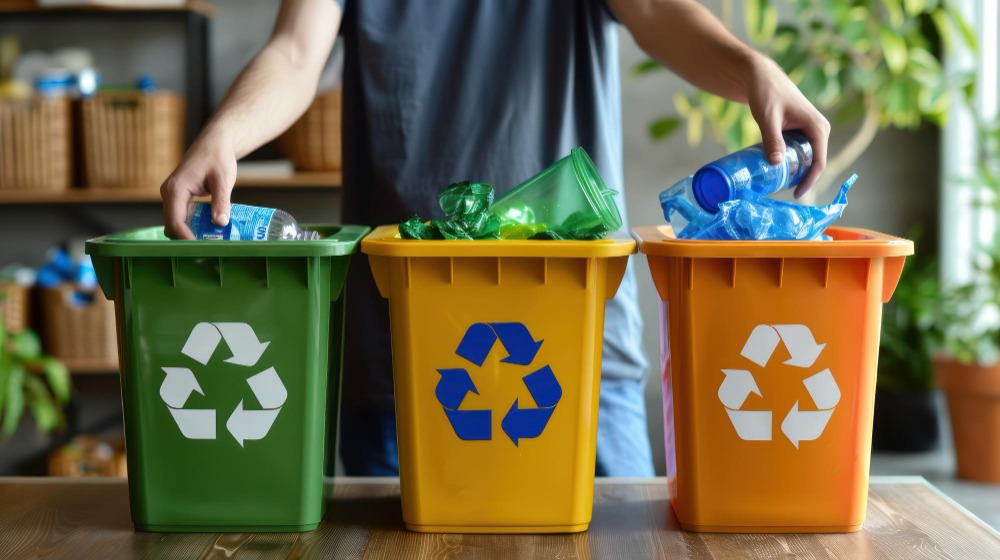

India, with its vast population and rapid urbanization, faces formidable challenges in effectively managing its waste. The nation generates over 62 million tons of waste annually[i], yet only a fraction of this is properly treated and disposed of. The burgeoning waste problem not only poses severe environmental hazards but also threatens public health and urban aesthetics.
In this article, we will delve into the current state of waste management in India, examining the myriad challenges faced and the innovative techniques being adopted to address this critical issue.
Current State of Waste Management in India
India’s waste management infrastructure is struggling to keep pace with the country’s rapid urban growth. Much of the waste generated is either dumped in open landfills or burned, leading to severe air and soil pollution thereby contributing to environmental pollution and posing health threats. According to recent reports[ii], only about 20-25% of the waste is segregated and processed through recycling or composting, while the rest is left to deteriorate in unsanitary conditions. Municipalities often struggle with inadequate infrastructure, limited financial resources, and insufficient public awareness about proper waste segregation and recycling practices. Despite these hurdles, there are ongoing efforts to improve waste management through innovative technologies, decentralized systems, and public-private partnerships. However, substantial progress is needed to achieve a sustainable and effective waste management system that can handle the growing demands of the nation.
Current challenges faced:
1. Lack of Infrastructure and financial constraints:
One of the primary challenges in India’s waste management is the inadequate infrastructure for waste collection, segregation, and processing. In many urban and rural areas, the systems in place are either outdated or insufficient to handle the vast quantities of waste generated daily. In urban regions, rapid population growth and urbanization have outpaced the development of waste management infrastructure, leading to an overwhelming accumulation of waste. Streets and public spaces often become dumping grounds for uncollected garbage, creating unsanitary conditions and contributing to air and water pollution.
In rural areas, the situation is often exacerbated by a lack of access to basic waste management facilities. Many villages rely on traditional methods such as open burning or dumping waste in nearby fields and water bodies. The absence of proper waste segregation at the source further complicates the problem, as mixed waste is more difficult and costly to process.
Additionally, many municipalities face financial constraints that prevent them from investing in modern waste management technologies and infrastructure. The lack of adequate funding and resources means that waste collection services are often irregular, and waste treatment facilities are insufficient or non-existent. This results in a cycle of inefficiency, where waste accumulates faster than can be managed, leading to widespread pollution and health hazards.
2. Public Awareness and Participation:
Citizens lack fundamental understanding of how proper waste segregation at the source can drastically reduce the burden on municipal waste management systems. This lack of awareness leads to the mixing of biodegradable and non-biodegradable waste, making it challenging to recycle or compost materials effectively.
However, in many areas, there is a pervasive indifference or lack of knowledge about proper waste disposal practices. This indifference can be attributed to several factors, including inadequate education about waste management, limited access to recycling facilities, and a lack of incentives to encourage responsible behavior.
3. Technological Limitations:
Many regions in India still rely on outdated and inefficient waste processing technologies, which significantly hampers the country’s ability to manage its waste effectively. These antiquated methods, such as open dumping and incineration without proper emission controls, not only fail to address the growing waste problem but also exacerbate pollution.
Incineration, when done without modern pollution control measures, releases harmful toxins and particulates into the air, posing serious health risks to nearby communities. Additionally, these traditional methods do not recover valuable resources from waste, resulting in the loss of potential materials that could be recycled or repurposed. This inefficiency underscores the urgent need for India to transition to modern, sustainable waste management technologies that can better handle the increasing volume and complexity of waste generated by its population.
By tackling these challenges head-on, India can move towards a more efficient and effective waste management system that benefits both its people and the environment.
Innovative Techniques and Solutions
Despite these challenges, there are several promising initiatives and technologies being implemented across the country to improve waste management:
- Waste-to-Energy[iii] Plants: Waste-to-energy (WtE) plants represent a promising solution for managing India’s growing waste problem while also generating renewable energy. These facilities convert non-recyclable waste materials into usable forms of energy, such as electricity, heat, or fuel, through various processes including incineration, gasification, and anaerobic digestion. By reducing the volume of waste destined for landfills, WtE plants help mitigate the environmental issues associated with open dumpsites, such as leachate contamination and methane emissions. Moreover, the energy produced from waste can supplement traditional power sources, contributing to a more sustainable and diversified energy mix. However, it is crucial that WtE plants are equipped with advanced emission control technologies to minimize air pollution and adhere to stringent environmental standards. When implemented correctly, waste-to-energy plants offer a dual benefit of waste reduction and energy generation, making them a key component of an integrated waste management strategy.
- Advanced Recycling Techniques: The adoption of advanced recycling technologies, such as mechanical biological treatment[iv] (MBT) and pyrolysis, can significantly enhance the efficiency and effectiveness of waste processing in India. Mechanical biological treatment (MBT) combines mechanical sorting to separate recyclable materials with biological processes like composting or anaerobic digestion to treat organic waste. This dual approach not only maximizes the recovery of valuable resources, such as metals and plastics, but also reduces the volume of waste that needs to be landfilled by converting organic waste into compost or biogas. Pyrolysis, on the other hand, involves the thermal decomposition of organic materials in the absence of oxygen, transforming waste into useful products like bio-oil, syngas, and char. This process can handle a wide range of waste materials, including plastics and other complex compounds, reducing landfill reliance and creating alternative energy sources. By integrating these advanced recycling technologies, waste management systems can become more sustainable, efficient, and capable of extracting greater value from waste streams, ultimately contributing to a circular economy.
- Public-Private Partnerships[v]: Collaborations between the government and the private sector are proving to be highly effective in addressing waste management challenges in India. Private companies bring valuable technological expertise and substantial investment to the table, enabling the implementation of advanced waste processing and recycling technologies that are often beyond the financial and technical reach of municipal authorities. These collaborations facilitate the development of innovative solutions. Meanwhile, the government plays a crucial role by providing regulatory support, creating conducive policies, and investing in necessary infrastructure. Public-private partnerships (PPPs) ensure that waste management projects are not only financially viable but also sustainable in the long run. The government’s involvement helps streamline operations, enforce environmental standards, and ensure that projects align with broader public health and environmental goals. This synergy between public and private entities creates a robust framework for tackling waste management issues, ultimately leading to cleaner cities, reduced environmental impact, and improved quality of life for citizens.
- Awareness Campaigns and Education[vi]: To bridge the gap, comprehensive awareness campaigns are essential. These campaigns focusing on educating the public about the environmental and economic benefits of waste segregation and recycling, using various media platforms to reach a broad audience. Schools, community centers, and local organizations can play pivotal roles in disseminating this information and fostering a culture of responsible waste management. Additionally, providing convenient access to recycling facilities and creating incentives for proper waste disposal can motivate citizens to participate actively. By fostering a well-informed and engaged community, India can significantly enhance its waste management efforts, ensuring that municipal initiatives are supported by the active participation of the public. This collaboration is vital for creating a sustainable and efficient waste management system that can cope with the demands of the nation’s growing population and urbanization.
- Landfill Management: Effective landfill management is crucial for mitigating the environmental and health impacts associated with waste disposal. Properly managed landfills are designed to minimize the release of pollutants into the environment, including leachate and methane gas, which can contaminate groundwater and contribute to greenhouse gas emissions. This involves engineering controls such as impermeable liners to prevent leachate from seeping into the soil and groundwater, as well as gas collection systems to capture and either flare or utilize methane for energy production. Regular monitoring and maintenance are essential to ensure these systems function correctly and to detect any potential issues early. Additionally, effective landfill management includes strategies for extending the lifespan of landfills through waste diversion programs such as recycling, composting, and waste-to-energy initiatives. Implementing best practices in landfill management not only helps protect the environment and public health but also supports sustainable waste management by maximizing the utility of existing landfill space and promoting resource recovery.
Success Stories
1. Pune’s SWaCH Cooperative[vii]
In Pune, the SWaCH (Solid Waste Collection and Handling) cooperative is a notable success story. SWaCH, a cooperative of self-employed waste pickers, provides door-to-door waste collection services, ensuring efficient waste segregation at the source. With over 3,500 members, SWaCH collects waste from more than 600,000 households. This initiative not only improves waste management but also empowers waste pickers by providing them with stable employment and social security benefits. The cooperative model has significantly reduced the amount of waste going to landfills and has increased recycling rates in the city.
2. Alappuzha’s Zero Waste Initiative[viii]
Alappuzha, a small city in Kerala, has gained international recognition for its zero-waste initiative. The city implemented a decentralized waste management system that emphasizes source segregation and composting. Households are encouraged to compost organic waste, and non-biodegradable waste is collected separately for recycling. This initiative has drastically reduced the amount of waste sent to landfills and has made Alappuzha one of the cleanest cities in India. The model has been so successful that it is being replicated in other parts of Kerala and beyond.
3. Indore’s Cleanest City Campaign[ix]
Indore, Madhya Pradesh, has consistently ranked as India’s cleanest city in the Swachh Survekshan rankings. The city’s success can be attributed to its robust waste management strategy, which includes 100% door-to-door collection, efficient waste segregation, and effective processing. Indore has set up multiple composting and recycling plants, significantly reducing the amount of waste sent to landfills. Public awareness campaigns and strict enforcement of waste segregation rules have also played a crucial role in maintaining the city’s cleanliness.
4. Bangalore’s Dry Waste Collection Centers[x]
Bangalore has implemented an effective system of Dry Waste Collection Centers (DWCCs) to manage non-biodegradable waste. These centers collect, sort, and recycle dry waste such as plastics, paper, and metal. The initiative has significantly improved waste segregation at the source and has created livelihood opportunities for waste pickers and local communities. The DWCCs help divert a substantial amount of waste from landfills, promoting recycling and resource recovery.
Conclusion
India’s journey towards effective waste management is fraught with challenges, but it is also marked by innovative solutions and resilient efforts. By embracing advanced technologies, fostering public-private partnerships, and enhancing public awareness, India can pave the way for a cleaner, more sustainable future. The collective effort of the government, private sector, and citizens is essential to overcoming the waste management crisis and ensuring a healthier environment for future generations.
The article is published in Taxmann and the same can be accessed in the following link:
[i]https://www.teriin.org/waste#:~:text=A%20study%20by%20TERI%20found,health%20concerns%20in%20the%20country.
[ii] https://mohua.gov.in/pdf/627b8318adf18Circular-Economy-in-waste-management-FINAL.pdf
[iii] https://mnre.gov.in/waste-to-energy/
[iv] https://www.ctc-n.org/sites/www.ctc-n.org/files/UNFCCC_docs/ref15x06_35.pdf
[v] https://www.nswai.org/docs/ReportPPPMunicipalSolidWasteManagement270812.pdf
[vi] https://swachhbharatmission.ddws.gov.in/sites/default/files/Swachhata-Samachar-PDf-English/Swachhata_Samachar_English_Nov_2023_0.pdf
[vii] https://swachcoop.com/
[viii] https://www.cseindia.org/cse-releases-its-rating-of-selected-cities-which-manage-and-segregate-their-waste-most-efficiently-8748
[ix] https://indorecity.in/how-indore-became-the-cleanest-city/#:~:text=Indore’s%20journey%20to%20the%20summit,landfill%20sites%20into%20green%20spaces.
[x] https://site.bbmp.gov.in/departmentwebsites/swm/Dry_Wast.html

